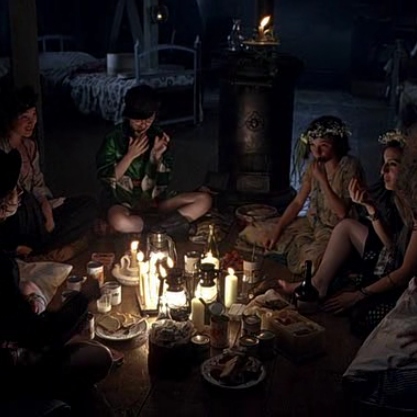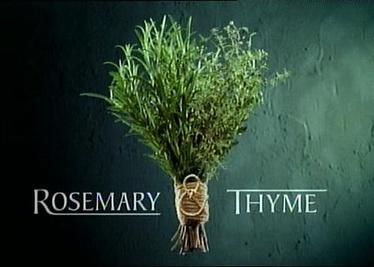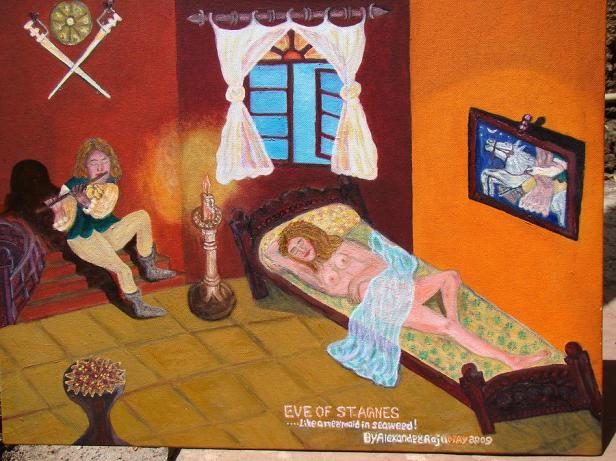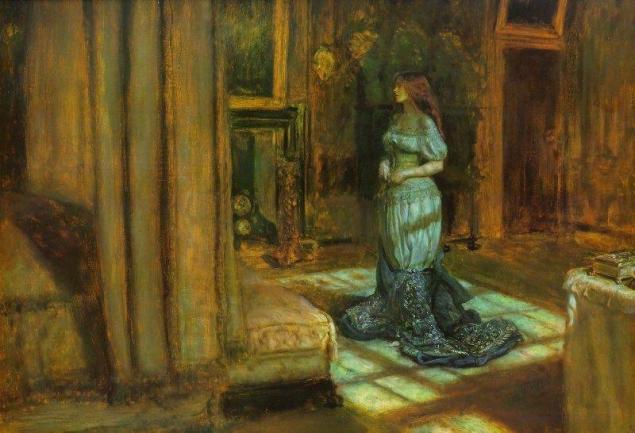
“They told her how, upon St. Agnes’ Eve,
Young virgins might have visions of delight,
And soft adorings from their loves receive
Upon the honey’d middle of the night,
If ceremonies due they did aright.” — John Keats
Single ladies, you might want to pay special attention to your dreams tonight. Legend has it that after midnight on the Eve of Saint Agnes Day (January 21st) young women are likely to dream of their future husband.
Of course, you will have to perform a few rituals in order to make this happen.
First, take one sprig of rosemary and one sprig of thyme.

Sprinkle them with water. Put the rosemary in your left shoe and the thyme in your right. Place each shoe on opposite sides of your bed.
Next, make sure you go to bed without any supper. (Apparently hunger is a good state to induce psychic dreaming.) Then, take off all your clothes, get in bed and lie supine with your hands underneath your pillow. Look up to the heavens and do not look behind you. Before falling asleep say,
“Saint Agnes, that’s to lovers kind
Come ease the trouble of my mind.”
Your future husband will then appear in your dream, kiss you and join you for the dinner you so devoutly skipped hours before.

This is an interesting tradition and it got me wondering: Just who was Saint Agnes and what qualifies her for this type of husband dreaming?
According to tradition, Agnes was a member of the Roman nobility. She was born in 291 AD and raised in one of the few early Catholic families, long before Constantine decided to convert the entire Roman empire to Christianity.
Agnes was a beautiful girl from a wealthy family and therefore considered a great catch for any man, since she had both good looks and money. By the time she was twelve years old, Agnes was considered to be of marrying age. ( I know! Horrendous by our standards, but quite normal for the 3rd century.) Many young men of noble status came calling but Agnes chose not to wed and was determined to keep her virginity. The guys, insulted by Agnes’ devotion to sexual purity, submitted her name to the authorities as a follower of Christianity. This of course led to her arrest.
The Prefect Sempronius (head honcho) condemned Agnes to be dragged naked through the streets to a brothel. Legend has it that as she prayed, her hair grew long enough to cover her entire body. (She at least had it easier than Cersei Lannister!)

It was also said that men attempted to rape her in the street, but all of them were immediately struck blind.
One of these men happened to be the son of Prefect Sempronius. He was struck not only blind but dead. However, he was revived after Agnes prayed for him. Even so, Agnes was still put on trial and sentenced to be burned at the stake. She was bound, gagged and tied down, but miraculously, the bundle of wood beneath her would not burn! The officer in charge then drew his sword and without blinking an eyelash, promptly beheaded her.
Agnes died on January 21, 304 AD, at the tender age of thirteen.
Perhaps you noticed a bit of irony here… Why would a virgin martyr, famous for purity and chastity, be qualified to predict the future husbands of young girls? Some ideas about this were clarified by author Robert Ellsberg in his book Blessed Among All Women: Saints Prophets and Witnesses For Our Time.
Ellsberg states: “In the story of Agnes the opposition is not between sex and virginity. The conflict is between a young woman’s power in Christ to define her own identity versus a patriarchal culture’s claim to identify her in terms of her sexuality.”
According to the view shared by Roman culture at the time, if Agnes would not agree to be one man’s wife, she might as well be every man’s whore. (Hence the trip to the brothel.)
Ellsberg further claims: “Agnes did not choose death. She chose not to worship the gods of her culture. …Espoused to Christ, she was beyond the power of any man to ‘have his way with her’. ‘Virgin’ in this case is another way of saying Free Woman.” It may be that because Agnes made a strong but painful choice, she was given the power to reveal a choice to others.
Saint Agnes’ story has inspired many artists including William Holman Hunt and John Everett Millais.

In the winter of 1819, poet John Keats wrote one of his most famous poems “The Eve of Saint Agnes”. The poem tells a medieval tale of a forbidden tryst between lovers Madeline and Porphyro, who, like Romeo and Juliet are both victims of their families ancient rivalry. The original text was reportedly so erotic that Keats’ editors made him tone it down before the poem could be published. Read the full text HERE.
If you decide to do an Agnes ritual and find a future husband on your horizon, please let me know! Here are some further folkloric interpretations of Saint Agnes Dreams:
Happy dreaming and happy Saint Agnes Day.

I’m suddenly glad that I’m a bloke. ❤
LikeLiked by 1 person
Haha! Agnes had it rough back then but things have definitely improved!
LikeLike
May St. Agnes intercede for us!
LikeLiked by 1 person
I believe she will 🙂
LikeLiked by 1 person
It is a lovely post! … and really interesting
LikeLiked by 1 person
Thanks so much Luisa! Glad you enjoyed it 🙂
LikeLiked by 1 person
❤
LikeLike
Reblogged this on GrannyMoon's Morning Feast.
LikeLiked by 1 person
I’ve never heard of this before. Very intriguing! 🙂
LikeLiked by 1 person
I thought it was intriguing too, and I loved Keats poem! Happy dreaming 🙂
LikeLiked by 1 person
Wonderful as always! Way back when, I dreamed of a tsunami drowning me, many months (and I rarely remember dreams). Yep, met him, married him, drowned a few times, but survived. Sometimes we should ignore the symbolism and see and hear what dreams are actually saying 🙂 But I love symbols and never really take my own advice 😀
LikeLiked by 1 person
A tsunami! That should have warned you! Ahh, but symbols and even idioms are very important in dreams. “She generally gave herself very good advice (though she very seldom followed it.)” is one of my favorite Alice in Wonderland quotes, haha 🙂
LikeLiked by 2 people
I didn’t know much about Saint Agnes but what you’ve written is fascinating. Love the bit about her hair growing to cover her!
LikeLiked by 1 person
She is an interesting saint! The husband dreaming ritual would make a great pajama party game. Wish I had known about her in my adolescence 🙂
LikeLiked by 2 people
I’d never heard of Saint Agnes. What a tough end. They were not very nice to women back then.
LikeLiked by 1 person
Yes, women had it very rough back then! I am sure Agnes was one of many. Thanks for reading! 🙂
LikeLiked by 1 person
Fascinating!
LikeLiked by 1 person
She was an interesting saint!
LikeLike
I really enjoyed this entry and I hope that you didn’t mind me posting it on my Twitter, sorry but I refuse to call it X. Damn I just did, I hope a single woman preferably a witch dreamt of me that night. Peace TonyK
LikeLiked by 1 person
Hi, glad you liked it! I do not mind you posting this on Twitter (or X, whatever, haha!) I always loved the folklore of Saint Agnes and few people, at least in the US, seem to be aware of it 🙂
LikeLike